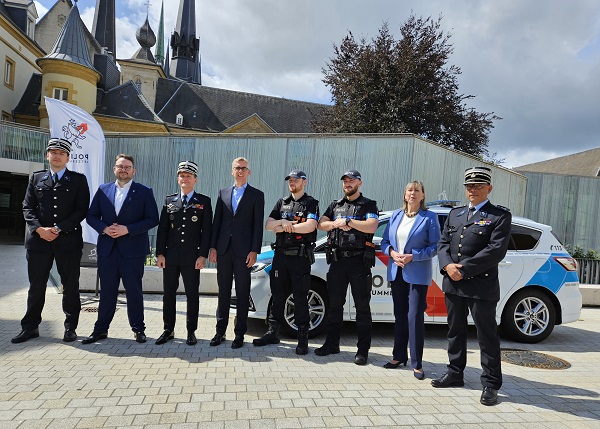 Credit: Jazmin Campbell / Chronicle.lu
Credit: Jazmin Campbell / Chronicle.lu
Monday 1 July 2024 marked the launch of a new pilot project for local police units in Luxembourg City and Esch-sur-Alzette.
On Monday morning, Luxembourg’s Minister for Home Affairs, Léon Gloden, the Mayor of Luxembourg City, Lydie Polfer, the Mayor of Esch-sur-Alzette, Christian Weis, and the Director General of the Grand Ducal Police, Pascal Peters, presented this new pilot project during a press press conference held at the Bierger-Center in Luxembourg-Ville.
The pilot project will run for six months (with interim and end-of-project reviews) and, as Minister Gloden explained, it aims to “bring the police closer to the people” under the “4P” principle (more personnel, presence, proximity and prevention) and thus improve the feeling of security among the public. In terms of more police personnel in general, the government is increasing the number of candidates per promotional round from 160 to 200.
Pascal Peters noted that specific patrols are being set up in the country’s two largest cities from 1 July. These patrols will focus on missions previously defined by the respective regional directorates after consultation with the mayors. Elaborating on the execution of this pilot project, Mr Peters emphasised that the objectives were to strengthen the police presence in public spaces, improve the accessibility of the police (greater proximity to the public) and for preventative actions on the terrain. The scope of the pilot project is thus to maintain local public order and have a more visible police presence in pre-defined strategic areas, to meet local security needs. All of this is expected to strengthen the feeling of security among the public.
Local police patrols will be deployed Monday to Saturday, as well as on Sundays depending on operational needs. In a first phase, a total of 20 local police officers will be present daily in Luxembourg City and four in Esch-sur-Alzette. The optimal number of patrols will be established following consultations.
Mayor Polfer recalled that a local police presence had long been requested by certain municipalities and political parties. She said she was “very happy” that the municipalities and government, together with the police, were taking this “concrete step” together. She mentioned Luxembourg City’s population size and related criminal activity, particularly in districts such as Gare/Bonnevoie and Ville-Haute. She said she was “convinced that this pilot project will make our capital safer” through an increased police presence and proximity to the people.
Mayor Weis agreed on the importance of more prevention work on the ground as well as the need for greater security but also a feeling of security among citizens: “Having officers close to our population is essential to respond to the needs of our community and strengthen the feeling of security, well-being and the quality of life of our citizens.” He mentioned target areas such as around the train station (Gare) and city centre in Esch-sur-Alzette.
Local police patrols currently wear the normal police uniform with a provisional blue armband (that says “Police locale”) to better identify them. However, work is currently underway to update the standard police uniform (for all officers), with the inclusion of an identifiable element for the local police.








